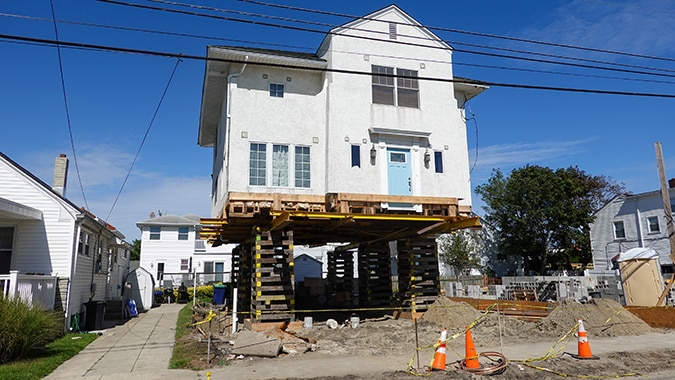The state’s proposed land use rules that are ostensibly intended to address sea level rise and climate change, will instead burden homeowners and businesses with increased costs, exacerbate permitting delays, impede urban redevelopment, and make it difficult to live, vacation or do business on New Jersey’s already developed barrier islands.
In comments submitted to the state Department of Environmental Protection earlier this week, NJBIA also noted the proposed PACT REAL rule, which covers 1,057 printed pages, would generally freeze development in place, prevent many homeowners and businesses from improving their properties, hamstring efforts to comply with the state’s new affordable housing mandates, and make redevelopment nearly impossible in seaside or riverside cities such as Hoboken, Jersey City, Sayreville, Asbury Park, Atlantic City and Camden.
The proposed rule is based on an assumed 5.1-foot rise in sea level over the next 75 years, a prediction that carries only a 17% scientific probability, according to one study from 2019.
The rule would create Inundation Risk Zones (IRZ) and a Climate Adjusted Flood Elevation (CAFE) where development, redevelopment and expansions would be required to be 5 feet higher than existing flood elevation standards. NJBIA urged DEP to instead use a more reasonable 2-foot standard.
Additionally, the proposed rule would require properties in an IRZ to meet a new 3% impervious cover standard, which means that no more than 3% of a property being developed can be taken up by the building, parking lot, driveways, and sidewalks.
“The imposition of these stringent limitations, especially the 3% impervious cover standard, effectively makes the IRZs “no build” zones for all development subject to the IRZ and coastal regulations,” NJBIA wrote.
Imposing a CAFE or IRZ elevation of an additional 5 feet will also negatively impact our older towns and urban centers along tidal waters that have downtowns, NJBIA wrote.
“These downtowns are already under enormous economic pressure from online sales and suburban centers. They rely on foot traffic of people on sidewalks entering retail stores and restaurants,” NJBIA said, noting that requiring these buildings to be elevated 5 feet will preclude other more business-friendly engineering floodproofing options.
The proposed rule will also impact homeowners and businesses on New Jersey’s barrier islands that are already mostly developed and vital to the state’s economy
“Despite the fact that tens of thousands of people own homes on the barrier islands, and hundreds of thousands if not millions of people vacation there each year, the proposed rule seeks to economically harm these already developed areas. The proposed rule would remove coastal center designations returning these lands to an environmentally sensitive area status and thus subject to a 3% impervious cover standard.”
Additionally, the rule would impose riparian zone requirements on the bay side of barrier islands, which will result in “micromanagement of normal property activities such as the removal of vegetation or expansion of buildings,” NJBIA said.
“Riparian zones were established to protect vegetation and habitat along stream corridors, not to impose regulatory requirements along a long line of developed streets with large houses,” NJBIA said. “The imposition of riparian zones will impact what homeowners and others can do to their property without any environmental benefit.”
NJBIA also warned DEP that the barrier island provisions of the rule could have unintended consequences for marinas already located there.
“By necessity (marinas) are at low levels adjacent to the water. They would be subject to the 3% impervious cover standards as well as the riparian zone restrictions. Such regulatory requirements may make it difficult if not impossible to maintain their businesses, which are vital to providing navigation access to the water consistent with the Public Trust Doctrine.”
Go here to read the entirely of NJBIA’s comments on the DEP PACT REAL Rule.
The New Jersey Business Coalition, which includes NJBIA, also submitted comments to the DEP this week. That letter, signed by more than 100 business groups, can be found here.




